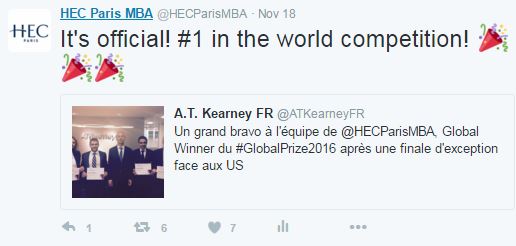When the four HEC Paris MBA students first stepped onstage at the AT Kearney Global Prize Strategy Case Competition, they had already logged 120 hours writing their proposal. Add in another 10 rehearsals for their verbal presentation, and it’s easy to see why team “Istisharat Key” won the prestigious, multi-week contest.
Now in its 20th year, the Global Prize offers participants an intense, real-time window into the consulting world. Competitors must develop an innovative and strategic solution to an actual case brought to AT Kearney. The four HEC Paris MBA students—Nadège Zambon, Elias Fares, Alexandre Legeay and Mathieu Mondan—faced off against nearly 100 teams from 10 schools, including LBS, Insead, Kellogg, SDA Bocconi, Booth and Columbia, to claim the prize. Their proposition brought the client’s annual growth to 15 percent, and overcame many of its operational problems.
Along with crunching data, interviewing, strategizing and making presentations, the long hours spent hammering out their proposal taught Istisharat Key many important lessons about teamwork.

Here are five takeaways:
1. Start with a well-balanced team
From the beginning, the students sought team members with complementary skills. “We had someone who is good at crunching numbers, we had someone who is good a drafting PowerPoints, and one of our team members is highly innovative and capable of seeing the big picture,” Elias explains. “Putting them all together was one of our main strengths.” As a result, the students easily capitalized on each other’s talents without having to choose a project leader.
2. Take it step-by-step
The team discussed many topics in the days before the competition, including the book, The Monk who sold his Ferrari. They embraced its advice to focus completely on the task at hand. “It says that if you have one eye on what you are doing now, and the other eye on your future goal, you will not be able to achieve your target,” Elias says. “We tried not be distracted by the idea of winning the entire competition. Even before our initial presentation at HEC, we felt like we had already learned from each other.”
3. Evenly distribute the workload
With a whopping 120 hours spent just on their written presentation, the four students made sure to evenly divide the work. “From the very beginning we said, ‘if we are doing this, we are really working for it’,” Mathieu explains. “We had to find the time to work together in the evening, on the weekend, in-between classes.” In the end, no one missed a work session, and the team benefitted from a solid, trust-filled relationship.
4. Focus on a common goal
Once committed to the project, the students clearly articulated a team mission. Instead of working for personal gain—landing a much sought-after job interview at AT Kearney, for example—they decided to promote the HEC Paris MBA. “We set one goal, which made the team very solid,” Elias says. “We said ‘if we do this well, it will benefit future intakes’. We wanted to pass the message, ‘This is HEC. We exist, we’re good, and we can compete against any university in the world’.”
5. Embrace creativity
In addressing the five years of stagnant growth experienced by their client, a mid-sized pharmaceutical company, Team Istisharat Key could have just focused on operational issues. Instead, their presentation had a story line and used a pyramid as a metaphor. “Like a pyramid, the base of our solution was strong,” Mathieu says. “You can see far from the top of a pyramid. That’s why our work included a vision for the future, three to five years out.” Applauded for the clarity and innovation of their proposal, the students scored the win.
For more about this year’s competition, visit: www.hec.edu/News-Room/
Recent Comments